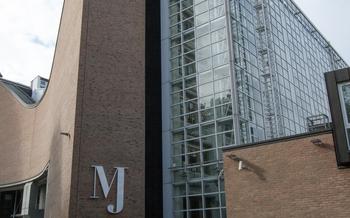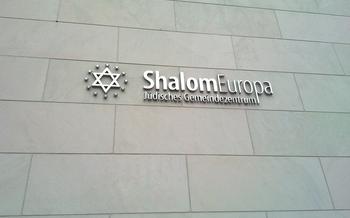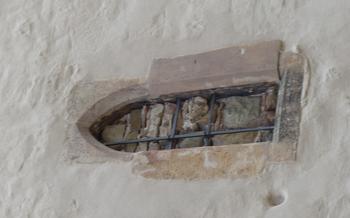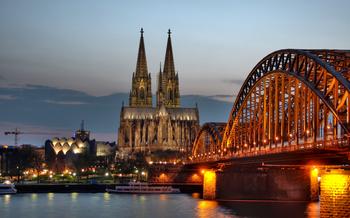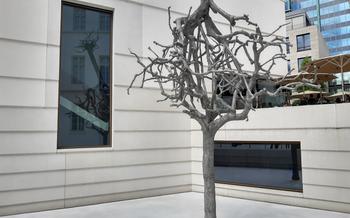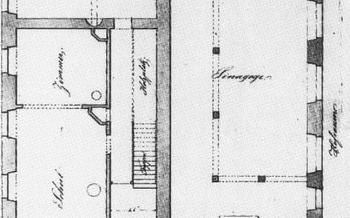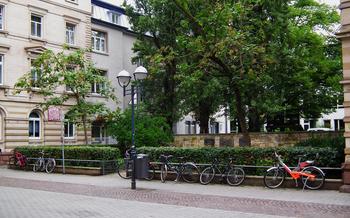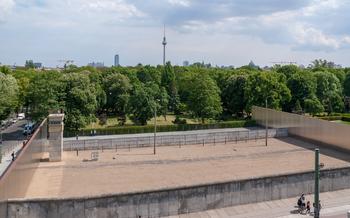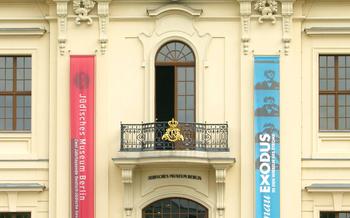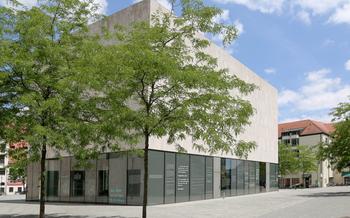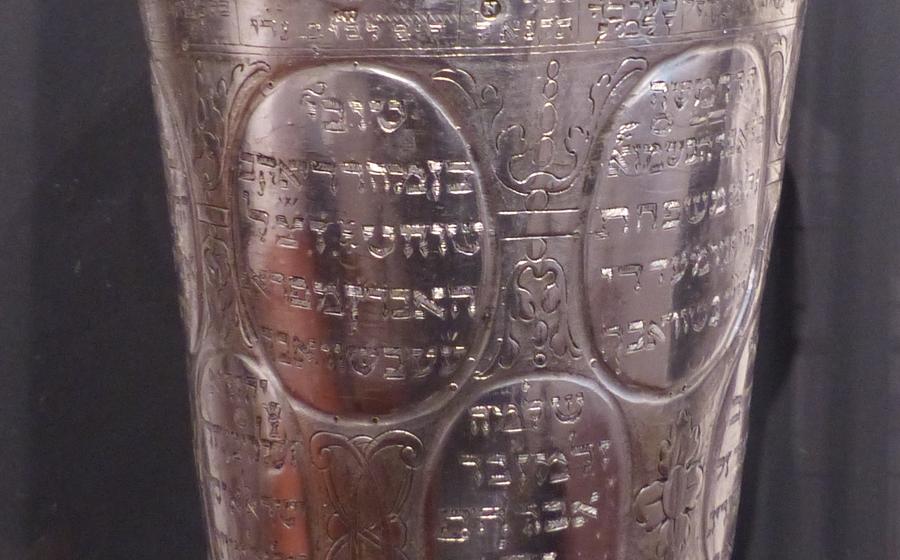
Jewish Museum Franconia (Jüdisches Museum Franken)
- The Jewish Museum Franconia (Jüdisches Museum Franken)
- Exploring the Museum's Permanent Exhibition
- The Post-War Era and Reconstruction
- Interactive Learning Opportunities
- Documenting Jewish Heritage
- Commemorating the Victims of the Holocaust
- Promoting Understanding and Tolerance
- The Synagogue in Nuremberg
- Jewish Cemeteries in Nuremberg
- Guided Tours and Special Events
- Accessibility and Facilities
- Insider Tip: The Synagogue Garden
The Jewish Museum Franconia (Jüdisches Museum Franken)
The Jewish Museum Franconia, located in the heart of Nuremberg, Germany, stands as a poignant testament to the rich history and enduring spirit of the Jewish community in the Franconia region. Established in 1988, the museum is housed in a beautifully restored 19th-century synagogue, serving as a vibrant center for preserving, studying, and sharing the diverse cultural heritage of Jewish life in Franconia.
Conveniently situated in the historic city center, the museum is easily accessible by public transportation, inviting visitors from around the world to delve into the fascinating stories and traditions of the region's Jewish community. Admission fees are reasonable, allowing for a budget-friendly yet enriching experience.
Exploring the Museum's Permanent Exhibition
The Jewish Museum Franconia houses a comprehensive permanent exhibition that delves into the rich history and culture of the Jewish community in Franconia. The exhibition is meticulously organized into thematic sections, each shedding light on a different aspect of Jewish life and experience in the region.
Highlights of the Collection
-
Artifacts and Documents: Visitors can explore a vast collection of artifacts, including religious objects, household items, and personal belongings that offer a glimpse into the daily lives of Jewish families in Franconia. Historical documents, such as marriage contracts, birth certificates, and community records, provide valuable insights into the social and cultural dynamics of the Jewish community.
-
Multimedia Displays: The museum employs interactive multimedia displays to engage visitors and enhance their understanding of Jewish history and culture. These displays incorporate historical photographs, videos, and audio recordings, bringing to life the stories and experiences of the Jewish community in Franconia.
-
Synagogue Model: A meticulously crafted model of a typical Franconian synagogue serves as a centerpiece of the exhibition, showcasing the architectural features and ritual objects associated with Jewish worship. Visitors can gain a deeper appreciation for the centrality of the synagogue in Jewish life and community.
-
Interactive Stations: Throughout the exhibition, visitors will find interactive stations that allow them to engage with the material in a hands-on manner. These stations include touchscreens with historical maps and timelines, as well as audio guides that provide additional information and context.
The Post-War Era and Reconstruction
After the devastation of World War II and the Holocaust, the Jewish community in Nuremberg faced the daunting task of rebuilding their lives and community. Many survivors returned to the city, determined to reclaim their heritage and create a new future for themselves and their children.
The Jewish Museum Franconia played a crucial role in this process, serving as a repository of memories and a source of inspiration for the community. It helped to document the experiences of survivors, preserve the memory of those who had perished, and foster a sense of continuity and belonging among the Jewish community in Nuremberg.
The museum's collection grew rapidly during this period, as survivors donated artifacts, documents, and personal belongings that had survived the war. These donations formed the foundation of the museum's permanent exhibition, which tells the story of Jewish life in Nuremberg from its medieval origins to the present day.
The museum also became a center for education and outreach, reaching out to the broader community to share the history and experiences of the Jewish community in Nuremberg. It organized exhibitions, lectures, and educational programs aimed at promoting understanding and tolerance and combating anti-Semitism.
Through its work, the Jewish Museum Franconia played a vital role in the rebuilding of the Jewish community in Nuremberg and in preserving the memory of the Holocaust. It continues to serve as a testament to the resilience and determination of the Jewish people and as a reminder of the importance of remembrance and reconciliation.
Interactive Learning Opportunities
The Jewish Museum Franconia is committed to providing visitors with a comprehensive and engaging learning experience. In addition to its permanent exhibition, the museum offers a variety of educational programs, workshops, and events throughout the year. These programs are designed to deepen visitors' understanding of Jewish history and culture, promote critical thinking, and foster empathy.
Educational workshops cater to different age groups and interests, covering topics such as Jewish customs and traditions, the Holocaust, and the history of anti-Semitism. These workshops often involve hands-on activities, multimedia presentations, and discussions, allowing participants to actively engage with the material.
The museum also hosts regular events, such as lectures, film screenings, and concerts, featuring renowned scholars, artists, and community leaders. These events provide a platform for discussions on contemporary issues related to Jewish life, identity, and social justice.
Through these interactive learning opportunities, the Jewish Museum Franconia aims to create a space for dialogue, reflection, and critical engagement with the past and present. Visitors are encouraged to ask questions, share their perspectives, and challenge their own assumptions, promoting a deeper understanding of the Jewish experience and its relevance to contemporary society.
Documenting Jewish Heritage
The Jewish Museum Franconia houses an extensive archive and research center dedicated to preserving and sharing the history of the Jewish community in Nuremberg and Franconia. This invaluable resource contains a vast collection of historical documents, photographs, and oral histories that provide a deeper understanding of Jewish life and culture in the region.
The museum's archive is a treasure trove of information for researchers, historians, and genealogists. It includes documents dating back to the Middle Ages, such as marriage contracts, birth and death records, and community regulations. These records offer insights into the daily lives, customs, and traditions of the Jewish community over the centuries.
The museum's collection of photographs is equally impressive, capturing the faces and stories of Jewish individuals and families from the 19th and 20th centuries. These images provide a glimpse into the vibrant Jewish community that existed in Nuremberg before the Holocaust.
In addition to written and visual records, the museum's archive also includes a collection of oral histories, capturing the personal experiences of Holocaust survivors and their descendants. These firsthand accounts provide a powerful and moving testament to the resilience and strength of the Jewish community in the face of adversity.
The Jewish Museum Franconia's archive and research center is a vital resource for preserving and sharing the history of the Jewish community in Nuremberg and Franconia. Through its extensive collection of documents, photographs, and oral histories, the museum provides a deeper understanding of the rich cultural heritage of the Jewish people in the region.
Commemorating the Victims of the Holocaust
The Jewish Museum Franconia houses a poignant memorial to the victims of the Holocaust from Nuremberg and the surrounding region of Franconia. The Hall of Names is a solemn space dedicated to honoring each individual who perished during this dark chapter in history. The names of the victims are inscribed on metal plaques, arranged alphabetically and accompanied by their dates of birth and death. Visitors can search for specific names or simply reflect on the sheer number of lives lost. The Hall of Names serves as a powerful reminder of the devastating impact of the Holocaust and the importance of remembering those who were taken.
Beyond the Hall of Names, the museum also features personal stories and artifacts that shed light on the individual experiences of those who suffered during the Holocaust. These include poignant letters, diaries, photographs, and everyday objects that belonged to victims. Through these personal accounts, visitors gain a deeper understanding of the human toll of the Holocaust and the resilience of the Jewish people in the face of unimaginable adversity.
Promoting Understanding and Tolerance
The Jewish Museum Franconia serves as a platform for promoting understanding and tolerance, fostering a climate of respect and dialogue. Through its educational programs, workshops, and events, the museum aims to combat anti-Semitism and promote diversity. It collaborates with schools, universities, and community organizations to raise awareness about Jewish history, culture, and the lessons learned from the Holocaust.
The museum's educational initiatives focus on fostering critical thinking, empathy, and respect for human rights. It offers guided tours tailored to different age groups, interactive learning experiences, and workshops that address topics such as anti-Semitism, prejudice, and the importance of tolerance. These programs encourage participants to engage in discussions, explore different perspectives, and challenge misconceptions.
By promoting understanding and tolerance, the Jewish Museum Franconia contributes to building a more inclusive and just society, where the lessons of the past serve as a reminder to reject hatred and discrimination in all its forms. It empowers visitors to become agents of change, promoting respect for diversity and fostering a culture of empathy and compassion.
The Synagogue in Nuremberg
The synagogue in Nuremberg, located in the heart of the city's old town, holds immense historical and cultural significance for the Jewish community. Built in the 14th century, it served as a central place of worship and gathering for centuries. The synagogue's elaborate Gothic architecture, featuring intricate stone carvings and stained glass windows, reflects the vibrant Jewish life that flourished in Nuremberg during the Middle Ages.
Tragically, the synagogue fell victim to the destructive forces of Kristallnacht in 193It was set ablaze by Nazi rioters, leaving only its charred remains. After World War II, the synagogue was meticulously reconstructed, restoring its former glory. Today, it stands as a powerful symbol of resilience and a reminder of the vibrant Jewish community that once thrived in Nuremberg.
Visitors to the synagogue can explore its beautifully restored interior, which features a majestic bimah (raised platform for reading the Torah) and an ornate Aron Kodesh (Torah ark). The synagogue's rich history is brought to life through informative exhibits and guided tours, shedding light on the traditions, rituals, and contributions of the Jewish community throughout the centuries.
Whether you are a history buff, a member of the Jewish community, or simply someone interested in exploring Nuremberg's diverse cultural heritage, a visit to the synagogue is a must. It is a place of remembrance, reflection, and celebration, where the spirit of the Jewish community continues to shine brightly.
Jewish Cemeteries in Nuremberg
Nuremberg is home to several Jewish cemeteries, each holding significant historical and cultural value. The oldest and most remarkable among them is the Old Jewish Cemetery, located in the heart of the city. Established in the 14th century, it is the oldest preserved Jewish cemetery in Germany. Over 2,000 gravestones, some dating back to the Middle Ages, can be found within its ancient walls. The inscriptions and symbols on these weathered stones tell the stories of generations of Jewish families who lived and died in Nuremberg.
Another notable Jewish cemetery is the New Jewish Cemetery, situated in the suburb of Fürth. Founded in 1872, it is the largest Jewish cemetery in Nuremberg and serves as the final resting place for many prominent members of the city's Jewish community. Among the notable graves here are those of Rabbi Samson Raphael Hirsch, a renowned Orthodox rabbi, and Julius Fürth, a prominent banker and philanthropist.
Visiting these cemeteries offers a profound insight into the history and traditions of the Jewish community in Nuremberg. They serve as poignant reminders of the rich cultural heritage that was nearly extinguished during the Holocaust. Today, these sacred grounds stand as symbols of remembrance, honoring the lives and legacies of those who came before.
Guided Tours and Special Events
The Jewish Museum Franconia offers guided tours in various languages to enhance visitors' understanding of the museum's exhibits and the history of Jewish life in Nuremberg. These tours provide a deeper insight into the museum's collection and allow visitors to ask questions and engage in discussions with knowledgeable guides.
In addition to guided tours, the museum hosts regular events, exhibitions, and lectures throughout the year. These events provide opportunities for visitors to learn more about Jewish culture, history, and contemporary issues. Special exhibitions often focus on specific themes or aspects of Jewish life, showcasing unique artifacts and documents from the museum's collection or from external sources.
Lectures and discussions are organized to address various topics related to Jewish history, culture, and the Holocaust. These events feature renowned scholars, experts, and survivors who share their knowledge and personal experiences, fostering a deeper understanding of the past and its relevance to the present.
By participating in guided tours, attending special events, and engaging in educational programs, visitors can gain a comprehensive understanding of the rich history and culture of Jewish life in Nuremberg, while also exploring broader themes of tolerance, diversity, and human rights.
Accessibility and Facilities
The Jewish Museum Franconia is committed to providing an accessible and inclusive experience for all visitors. The museum is wheelchair accessible, with ramps and elevators throughout the building. Visitors with disabilities can also borrow wheelchairs from the museum's reception desk.
The museum has a museum shop and a café on the premises, both of which are also wheelchair accessible. The museum shop offers a wide range of books, souvenirs, and gifts related to Jewish history and culture. The café serves light refreshments and snacks, as well as traditional Jewish dishes.
The museum also has a number of facilities for families with young children. There is a family room where parents can change diapers and feed their children. There are also a number of interactive exhibits that are designed to engage and educate children.
To make the most of your visit, consider joining a guided tour. Tours are available in various languages, including English, German, and Hebrew. Tours are led by knowledgeable and experienced guides who will provide you with insights into the museum's collection and the history of Jewish life in Nuremberg.
The museum also hosts a number of regular events, exhibitions, and lectures throughout the year. These events are a great way to learn more about Jewish history and culture, and to meet other people who are interested in the same topics.
Insider Tip: The Synagogue Garden
Adjacent to the Jewish Museum Franconia lies a hidden gem known as the Synagogue Garden. This serene oasis offers a tranquil space for visitors to reflect and remember the history of the Jewish community in Nuremberg. The garden features lush greenery, commemorative plaques, and a poignant memorial to the victims of the Holocaust. Take a moment to wander through the garden, paying your respects to those who suffered and lost their lives during this dark period in history. The peaceful atmosphere of the garden provides a stark contrast to the often heavy and emotional themes explored within the museum. Here, visitors can find solace and a sense of serenity as they contemplate the resilience and spirit of the Jewish people.
